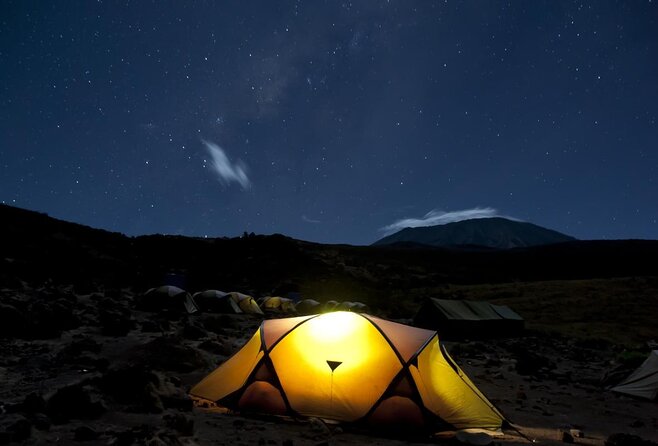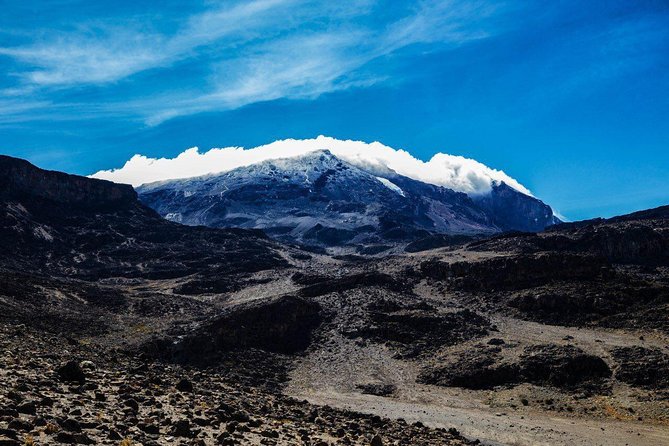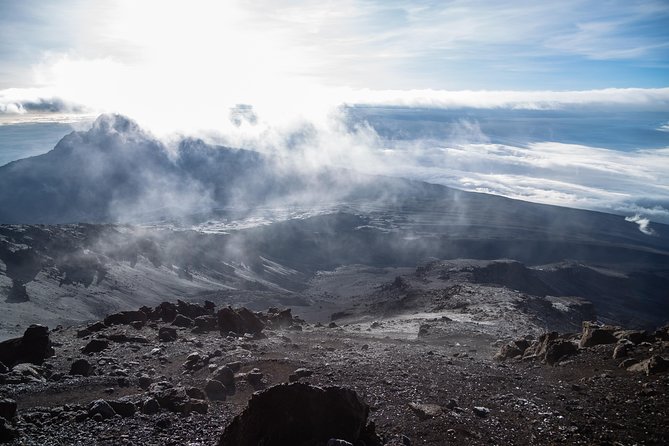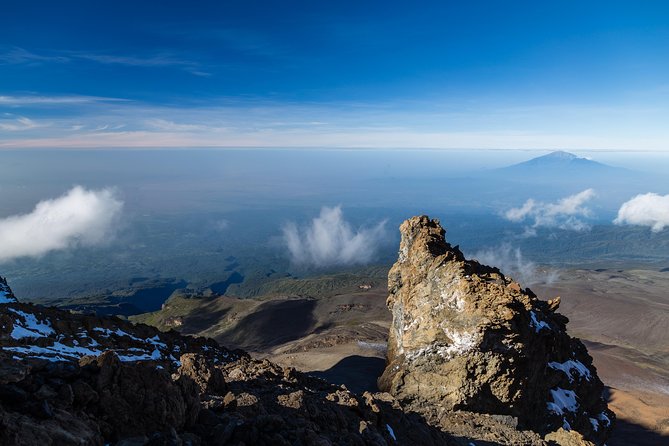Tackling the mighty Kilimanjaro via the Northern Circuit Route is no easy feat, but this 8-day itinerary offers a well-supported and comfortable experience. Hikers will find themselves in good hands, with certified guides, high-quality equipment, and a professional support crew ensuring a safe and successful climb. While the trek itself poses physical and mental challenges, the accommodation, transportation, and meal plan are thoughtfully curated to provide climbers the necessary fuel and respite along the way. As participants embark on this extraordinary journey, they’ll undoubtedly uncover the true essence of this majestic mountain – a challenge worth taking on for those seeking an adventure like no other.
Key Points

- The 8-day Northern Circuit route for climbing Kilimanjaro includes 2 nights at the Aishi Machame Hotel and camping in high-quality North Face VE-25 tents.
- Ground transportation to and from Kilimanjaro International Airport (JRO) and all necessary park fees are included in the package.
- The climb is led by certified Wilderness First Responder guides and includes medical equipment, oxygen tanks, and altimeters to monitor climbers’ health.
- The meal plan offers a variety of energy-rich breakfast, lunch, and dinner options to cater to various dietary preferences.
- Participants are advised to engage in comprehensive fitness training and familiarize themselves with high-altitude hiking and altitude sickness management prior to the climb.
Accommodation Details
Hikers will stay at the Aishi Machame Hotel for 2 nights, with 2 guests per room, except for solo climbers.
On the Kilimanjaro trek, they’ll sleep in North Face VE-25 tents, accommodating 2 hikers per tent, again excluding solo climbers.
The hotel offers a comfortable and convenient base before and after the climb, while the sturdy, high-quality tents provide shelter and a good night’s rest on the mountain.
This setup ensures everyone has a secure and enjoyable accommodation experience, whether they’re climbing solo or as part of a group. With these well-considered arrangements, climbers can focus on the challenge ahead without worrying about their living situation.
You can also read our reviews of more tours and experiences in Moshi.
Transportation and Logistics

All ground transportation to and from the Kilimanjaro International Airport (JRO) is included, ensuring a seamless start and end to the adventure.
Guests will be met at the airport and transferred to their hotel in Arusha. On the final day, they’ll be transported back to the airport for their onward journey.
This convenient service takes the hassle out of navigating local transportation, allowing climbers to focus on the challenge ahead.
With round-trip airport transfers, the team can arrive relaxed and depart refreshed, making the most of their time on the mountain.
The smooth logistics provided give peace of mind and allow participants to fully enjoy the Kilimanjaro experience.
Climb Inclusions

This comprehensive package includes all the necessary fees collected by the Kilimanjaro National Park, ensuring a seamless and compliant trek.
Climbers can anticipate the support of certified Wilderness First Responder guides, who’ll prioritize their safety and well-being throughout the journey.
Staying hydrated and replenished is essential, so the package includes a variety of drinks like tea, coffee, juices, and soda.
High-quality branded group equipment, such as a dining tent, sleeping pads, and crockery, will enhance the overall experience.
In addition, medical kits, oxygen tanks, and altimeters are provided to monitor climbers’ health.
The professional climbing crew, including porters, camp masters, and cooks, will ensure delicious and energy-rich meals to fuel the ascent.
Meal Plan
Across the duration of the Kilimanjaro climb, climbers can look forward to a total of 9 breakfast servings, 7 lunches, and 8 dinners, all of which are designed to provide the necessary energy and sustenance required for the arduous trek.
The meal plan offers a choice of options for each meal, catering to various dietary preferences such as:
- Vegetarian
- Vegan
- Lactose-free
- Gluten-free
- Halal
These hearty, energy-rich meals are prepared daily by a professional culinary crew, ensuring that climbers are fueled and nourished throughout their journey to the summit.
With a variety of tasty options available, climbers can keep their bodies strong and energized as they tackle the challenges of the Northern Circuit Route.
Additional Information

Tips for the climbing crew are optional and based on the level of satisfaction with the trip. Mountaineering insurance covering trekking up to 6000 m/19685 ft is highly recommended. Climbers will need to bring their own personal equipment and gear, such as hiking outfits, boots, and sleeping bags, though these items are also available for hire. Visas can be obtained upon arrival at Kilimanjaro International Airport, costing USD 50 for most nationals and USD 100 for US passport holders. Single accommodation at the hotel and in a tent can be arranged at an additional charge.
| Item | Cost |
|---|---|
| Tips for Crew | Optional |
| Mountaineering Insurance | Highly Recommended |
| Personal Gear | Bring Your Own or Hire |
| Visa | USD 50 – USD 100 |
Booking and Payment
To book the 8-day Kilimanjaro Climb via the Northern Circuit Route, climbers can contact the tour operator directly. Payment is required to secure the reservation, with a variety of options available. These include:
- Credit/debit card (Visa, Mastercard, American Express)
- Bank transfer
- Mobile money (M-Pesa, Airtel Money, etc.)
- PayPal
A deposit of 30% of the total cost is due upon booking, with the remaining 70% payable no later than 4 weeks before the climb. For those booking last-minute, full payment is required.
The tour operator provides a detailed payment schedule and clear cancellation policies to ensure a smooth booking experience. With the right preparations, adventurers can embark on an unforgettable Kilimanjaro journey.
Itinerary
The Northern Circuit Route on Kilimanjaro spans 8 days, providing climbers with a comprehensive and scenic trek through diverse landscapes.
Day 1 starts with a transfer from Arusha to the Londorossi Gate, where the hike begins through lush forests.
Days 2-4 take trekkers through moorland, valley, and alpine desert, culminating at Gilman’s Point.
On Day 5, climbers ascend to Uhuru Peak, the highest point on the mountain.
The descent follows the Northern Circuit, with overnights at the Crater Camp and Mweka Camp.
The final day involves a scenic hike back to the Mweka Gate.
Throughout the journey, climbers enjoy exceptional views, varied terrain, and the expertise of the certified guides.
Safety and Training
Climbing Kilimanjaro requires thorough preparation to ensure the safety and well-being of participants. Proper training and physical conditioning are paramount, as the trek involves navigating challenging terrain and high altitudes.
To maximize your chances of success and minimize risks, consider the following:
- Engage in a comprehensive fitness regimen focused on cardiovascular endurance, strength training, and flexibility exercises for at least 3-6 months prior to the climb.
- Familiarize yourself with high-altitude hiking, either through local trails or simulated altitude training.
- Acquire the necessary technical skills, such as using trekking poles and navigating rocky, uneven paths.
- Familiarize yourself with the symptoms and management of altitude sickness, ensuring you’re equipped with the proper medication and know how to respond.
Frequently Asked Questions
What Is the Success Rate for the Northern Circuit Route?
The northern circuit route on Kilimanjaro has a high success rate, with around 80-90% of climbers reaching the summit. This route offers a longer acclimatization period, increasing the chances of successfully reaching the roof of Africa.
How Often Do Groups Encounter Bad Weather on the Trek?
Hikers on treks often encounter unpredictable weather conditions, with rain, wind, and temperature fluctuations common. However, experienced guides monitor conditions closely and adjust plans to ensure safety and maximize chances of summit success, even in inclement weather.
What Is the Best Time of Year to Attempt the Climb?
The best time to attempt the climb is during the dry seasons of January-March and June-October. These periods offer the most stable weather and fewer crowds, though the temperatures can be quite cold at higher elevations.
Can I Bring My Own Food/Snacks on the Trek?
Yes, hikers can bring their own food and snacks on the trek. The climbing company provides all meals, but allowing personal provisions ensures hikers have their preferred foods and supplementary snacks throughout the hike.
Is There an Option to Hire a Private Guide or Porter?
Yes, you can hire a private guide or porter. This provides more personalized support and flexibility on the trek. The cost for a private guide or porter is an additional charge on top of the standard package.
Recap
The Kilimanjaro Climb, Northern Circuit Route (8-Day) offers a comprehensive package that ensures a comfortable and well-supported experience.
With ground transportation, certified guides, high-quality equipment, and a professional support crew, climbers can focus on their journey to the summit.
The meal plan and pre-climb training guidance further enhance the chances of a safe and successful climb, making this route an attractive option for those seeking a memorable Kilimanjaro adventure.
More Tour Reviews in Moshi
Not for you? Here's more things to do in Moshi we have recnetly reviewed
- 7 Days Mid Range Tanzania Wildlife Safari
- Private Multi Day Safari Tour in Tanzania
- Private Kilimanjaro Hike 7 Day Lemosho Route
- 1-Day Moshi Villages Bike Tour
- Chemka Hotsprings
- 6-Days Mt. Kilimanjaro Bike Trek -With- BURIGI CHATO SAFARIS CO L.T.D
- 7 Days Lemosho Route Kilimanjaro Climbing | Solely Tours
- West Kilimanjaro Cycling Adventures
- 8 Days Lemosho Route Climbing Mt. Kilimanjaro
- Moshi City Bike Day Trip
- The Best 7 Days Kilimanjaro Hiking Machame Route in & 2025
- 6 Days Tanzania Budget Camping Safari With Migration
